If A Monkey Takes A Selfie, Who Owns The Copyright?
Wikipedia is refusing to recognize a photographer's copyright claim because a monkey took the picture.
Wikipedia is refusing to recognize a photographer’s copyright claims to a photograph because it claims that the copyright actually belongs to a monkey:
If a monkey snaps a selfie in the forest, does he own it?
By now, the legal pseudo-doctrine of “he who takes the selfie owns the selfie” has settled into the collective consciousness. But what happens if an animal takes the photo?
British photographer David Slater is locked in a dispute with Wikimedia Commons (and its parent organization the Wikimedia Foundation) over whether a photo taken by an animal with a photographer’s camera becomes part of the public domain or the property of the camera’s owner.
Slater insists he owns the rights to the image of a monkey staring curiously into the camera as he snapped a selfie, and the photographer claims he’s suffered considerable expense to secure the photos. The fact that they have been, essentially, distributed for free on the Internet through the Wikimedia Commons Web site has cost him untold amounts of money.
“This is ruining my business,” Slater told The Post on Wednesday. “If it was a normal photograph and I had claimed I had taken it, I would potentially be a lot richer than I am.”
The now-famous self-portrait, if you will, was taken by a crested black macaque (Macaca nigra) in an Indonesian forest in 2011. Slater traveled to the country from Gloucestershire and spent three days following the animals with his camera equipment and a tour guide.
One day, he said, he set up a tripod and walked away for a few moments. When he returned, the monkeys had grabbed his camera and started snapping pictures. Thus, the monkey selfie was born.
That amazing story took off in media reports. The most iconic of the images was featured by The Guardian, the Telegraph and Huffington Post, among others.
Soon enough, it showed up on Wikipedia — first on the page for the species of monkey, then on Wikimedia Commons, which hosts images in the public domain.
In early 2012, Slater officially asked Wikimedia to take down the image. It was removed, but was later added again by another user. This time, it remained on Wikimedia Commons.
(…)
Slater claimed to own the copyright. Wikimedia disagreed.
In an interview, Wikimedia Foundation’s Chief Communications Officer Katherine Maher said the organization is confident that the legal basis for denying Slater’s request is sound, because the person that takes the photo should own the copyright. But a person didn’t take this one.
“Monkeys don’t own copyrights,” Maher said. “What we found is that U.S. copyright law says that works that originate from a non-human source can’t claim copyright.”
According to Maher, Slater would have had to make “substantial changes” to the image — beyond cropping, color correcting and other cosmetic adjustments — in order to own the copyright over the changed product.
“So what we found was that if the photographer doesn’t have copyright and the monkey doesn’t have copyright then there’s no one to bestow the copyright upon,” Maher said. Thus, the lawyers validated what Wikimedia Commons’ editor community had determined to be a public-domain reasoning for leaving the image up.
In some reports, this story is being rather erroneously reported as Wikimedia saying that the monkey owns the copyright to the photographs in question, but that’s not really the argument that is being made here. First of all, quite obviously an animal does not have legal rights under American or international copyright laws. Second, as the quote above makes clear, what they are actually contending is that Slater does not own the copyright to the photograph because he didn’t take it and that, since there is no natural person who could qualify as the copyright owner under the law it is completely in the public domain.
The Volokh Conspiracy’s David Post says that Wikimedia likely has the better legal argument here:
[Wikipedia is] on very firm footing on that one – though in our IP-engorged age, it may be hard for some people to accept the fact than anything useful/valuable/beautiful could come unencumbered by 100 years or so of copyright rights. If the monkey took the photo — and Slater is himself the source of the story that the monkey snapped the photo using his (Slater’s) camera — nobody owns the copyright; nonhumans cannot own copyright (or, as far as I know, personal property of any kind). Slater has no copyright claim, because the photo was not his original work – it was the monkey’s. But monkeys can’t own copyright. Furnishing the monkey with a camera no more gives him a copyright claim in the work than Microsoft’s furnishing me with a word processing program gives them copyright in what I write.
Slate’s Jordan Weissmann reports that the legal community tends to agree:
According to copyright professors, Wikimedia is right: The photo is almost certainly in the public domain.
“It’s a great final-exam question for a copyright class,” says June Besek, executive director of the Kernochan Center for Law, Media, and the Arts at Columbia Law School. “Under the copyright law as it’s been interpreted, there has to be human authorship for there to be copyright. So I would say there isn’t copyright on the photo.”
But didn’t Slater play an important role in the photo’s production, by providing the camera to the monkey?
Not really, Besek says. Authorship of a photo usually involves choosing the perfect angle, moment, and light. “If the situation were different—so the photographer set up a jungle photo, and the photographer stepped out for a smoke, and the monkey ran up and pressed the button, then I would say yes, there is human authorship,” Besek says.
A macaque grabbing your Nikon isn’t good enough.
“The photographer doesn’t own it. And the monkey doesn’t, either. It’s in the public domain,” says Chris Sprigman, a law professor at New York University. To copyright a work, an author needs to show he produced it through his own creativity. It doesn’t matter if you traveled thousands of miles to capture a photo if you weren’t involved in actually snapping it.
“The fact is, copyright’s not there to reward people for their labor—it’s to incentivize people to create new books or poems,” Sprigman adds. “Did this guy need an incentive to produce monkey selfies? No. He needed an incentive to go to Indonesia to take photographs. And by accident, he ended up with monkey selfies. The monkeys didn’t need incentives, either. They just did it for the pure pleasure of hearing the shutter click.”
Under the law, a photograph generally belongs to whomever created it. In this case, however, nobody created the photograph in question. The result would be the same if, for example, Slater had placed his camera on a tree stump and it had accidentally fallen, causing a photograph to be taken that was memorable for some reason. In that case, there would have been no physical interaction at all that caused the photograph to be created, not by Slater and not by another being. Such a photograph would no more belong to Slater under the law than the “monkey selfie” does. In both cases, he did not take the photograph, so under all applicable copyright laws he cannot assert a claim over it. Given the purpose of copyright law, this seems to be an entirely appropriate outcome. As noted above, these laws exist to encourage people to undertake creative efforts by guaranteeing them some level of compensation for their creative efforts. There were no “creative” efforts here, just a photographer who left his camera alone for a moment, during which a monkey walked up to it and a picture was snapped. Slater has no legal claim whatsoever.
I guess the lesson here is not to leave your camera lying around where those damn dirty apes can get their paws on it.
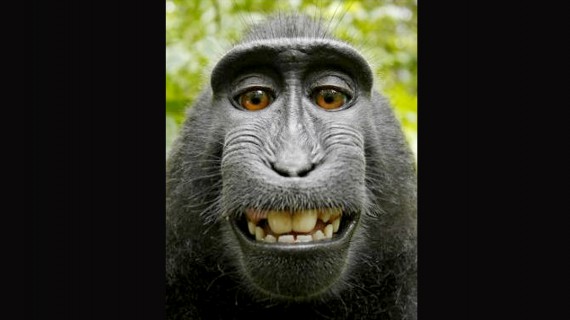

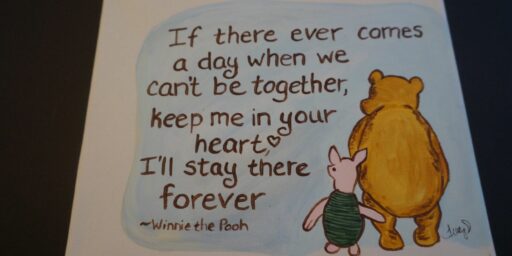
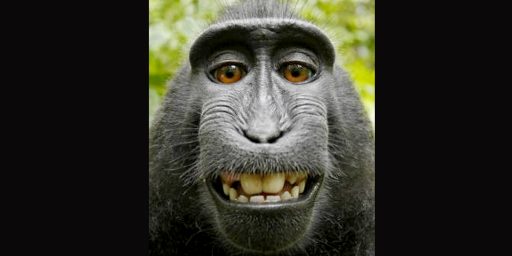
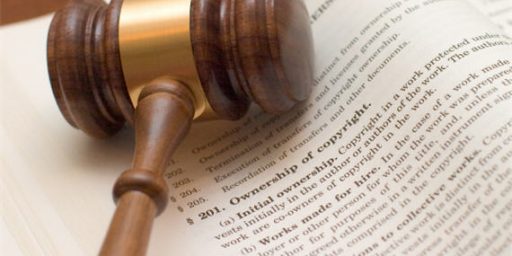
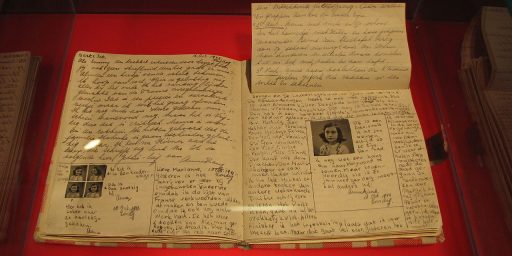
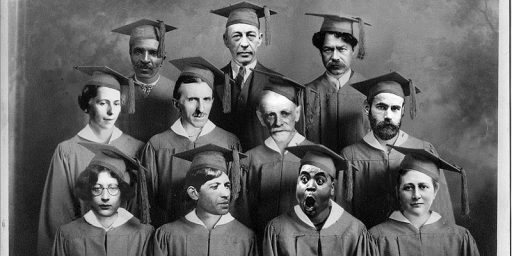
Clearly…it…is…August…the…news…cycle…is…beating…ever…so…slowly…nearly……… … .. _____________________
i would say the “KARDASHIANS” own the copyright… lol
Doug, thank you for this. This is priceless, and a hoot (in all respects) for those of us in IP law.
I find that picture disturbing.
Can you do a post about Kate Upton?
Maybe one on George Clooney for equalities sake?
Thanks.
No. It’s Mickey’s Monkey…
https://www.youtube.com/watch?v=UwlGn7uORYg
Dude… Thanks for putting Charlton Heston’s voice in my head for the next 8 hours. You know that never completely washes out right?
Does this mean if a million monkeys sit at typewriters for a million years and eventually produce Hamlet, they still won’t be able to copyright it?
The photographer is an idiot. If he doesn’t tell anyone the monkey snapped the photo, he would have no issue and the photo would be his.
However, then the photo would just be another monkey photo.
The very fact that the monkey snapped the photo is what makes it a unique photo, but which also, based on the law, makes it a public domain photo.
Quite the conundrum.
Well, no. If he had taken the picture it would have been just another pic and not inspired all the attention of the ”monkey selfie”. The monkey added the value by its actions.
http://commons.wikimedia.org/wiki/Commons:Deletion_requests/File:Macaca_nigra_self-portrait.jpg for the online part of the debate driving wikimedia’s decision.
@Grewgills: Yeah, how good a photographer can he be if one photo ruins his business? I think he’s lost some perspective on the situation or he wasn’t a very good photographer to start with.
I keep thinking of that tired old saw about one thousand monkeys with one thousand typewriters eventually producing a Shakespeare play. At least there wouldn’t be an argument over public domain.
A lawyer needs to take on the monkey as a client…. obviously there is no reason the US legal system shouldn’t benefit from this.
Send lawyers, puns, and monkeys… the sh*t has hit the fan
Lettuce, puns, and monkeys?
@JAMIE:
Didn’t you read the expert commentary that said nonhumans can’t own copyright? So, no Kardashians…
@DrDaveT: Dr. Dave, I thought the KARDASHIANS were “NON-HUMAN”..